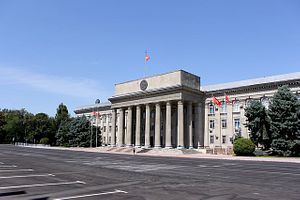On Thursday, September 4, the official campaign period ahead of Kyrgyzstan October 4 parliamentary election kicks off. With more than a dozen parties contesting the election, a recent survey revealed that nearly a third of likely voters don’t know (or refused to say) who they would vote for. At the same time, more than 75 percent of those polled said they intended to vote.
The International Republication Institute’s (IRI) Center for Insights in Survey Research (CISR) conducted a poll of Kyrgyz across the country between August 6 and 15 via telephone. The results provide a glimpse into how the Kyrgyz feel about the pending election, their political options, and the government’s handling of the coronavirus pandemic.
When asked whether they thought the country was headed in the right or wrong direction, only 41 percent of respondents said Kyrgyzstan was headed in the right direction. When divided by region, the answers showed a large north-south divide: Eighty-eight percent of respondents in the capital, Bishkek, said the country was headed in the wrong direction; in the city of Osh, however, 79 percent said the country was headed in the right direction.
Since Sooronbay Jeenbekov came into the presidency in late 2017, a greater number of survey respondents have said the country is headed in the wrong direction. When the survey was run in November 2017, a record high of 66 percent said the country was headed in the right direction. In each survey since the percentage saying the same has gradually tumbled with the December 2019 survey showing 52 percent agreeing the country was headed in the right direction.
Arguably, the final push — propelling those saying the country was headed in the wrong direction into a majority — was the coronavirus pandemic.
When asked “To what extent are you satisfied with the national government’s response to the coronavirus?,” just 32 percent responded that they were either “very satisfied” or “somewhat satisfied.” Sixty-seven percent responded “somewhat dissatisfied” or “not at all satisfied.” Again, there is an evident north-south divide in the survey responses: 1 percent of respondents in Bishkek were “very satisfied” with the government’s response and 10 percent were “somewhat satisfied”; in Osh, 19 percent were “very satisfied” and 36 percent “somewhat satisfied.”
“The poll shows that voters are ready for change,” IRI noted in a press release about the survey, highlighting that 77 percent of the survey respondents said they planned to vote.
But as of mid-August, there was no consensus among those surveyed as to what party could deliver the desired changes. Unsurprisingly, when asked to name political parties with which they were familiar, the Social Democratic Party of Kyrgyzstan (SDPK) was most named (43 percent), followed closely by Ata-Meken (42 percent) and then Respublika (28 percent), Ata-Jurt (27 percent) and Bir-Bol (24 percent). All those parties, importantly, are currently in parliament in some form but not all are running like they did in 2015.
Respublika and Ata-Jurt merged in 2014 ahead of the 2015 parliamentary election and split everywhere except in parliament, where they held 28 seats, in 2016. This time around, Respublika is running but Ata-Jurt is not — its candidates are now under the Mekenim Kyrgyzstan banner. Importantly, that merge took place after the survey was run. The party lists are a who’s who of Kyrgyz political and public figures, and as Bruce Pannier highlighted recently, there has been plenty of shifting and merging between various parties in the pre-election phase.
When asked, “If the parliamentary elections were held today, for which party would you vote?” 27 percent of all survey respondents said that they did not know or refused to answer. A further 15 percent declared they would vote “against all” of the parties.
IRI also breaks down the same question between all respondents, likely voters (those who said they planned to vote in the upcoming election), and decided voters (meaning those who said they planned to vote in the upcoming election and also expressed a pary preference) but in no version of how the data can be displayed does any party get more than 15 percent. Ata-Jurt, which isn’t running under its own name, led among decided voters with 15 percent.
Kyrgyz voters are perhaps right to hesitate in picking a party just yet, especially given the fact it’s not clear which parties will make the ballot. When the poll was conducted, in early to mid August, the field was large and unconfirmed. It’s still a bit confusing the day before the official start of campaigning.
The Kyrgyzstan party’s difficulties are illustrative. The Central Election Commission (CEC) declined to register the party in late August, noting that a non-authorized person submitted the party’s paperwork and may have done so after the deadline. The party challenged the commission’s decision in court and the court agreed with the party. The CEC’s appeal to the Supreme Court merely upheld the lower court’s ruling that the commission had to accept the party’s documents.
Meanwhile, a host of other parties intending to run had “inconsistencies and violations” in the documents they submitted tor the CEC. The parties have an opportunity to correct errors and be registered.
By law, the campaign period for an election is limited to one month, with a hard stop the day before the election. That hasn’t stopped all from jumping the gun. On August 31, the CEC fined a Kyrgyz singer 7,500 soms ($95) for premature campaigning on behalf of the Mekenim Kyrgyzstan party.
There have been other scandals too. Tursunbai Bakir uulu filed a complaint against and threatened to sue the Butun Kyrgyzstan party for excluding him from its preliminary party list. Meanwhile, there’s already talk of voters being offered money for their votes.
About a month out from election day, the field is still fluid and per IRI’s survey there’s no real frontrunner. At the same time, a majority of Kyrgyz intend to vote and don’t seem satisfied with the present government.
































